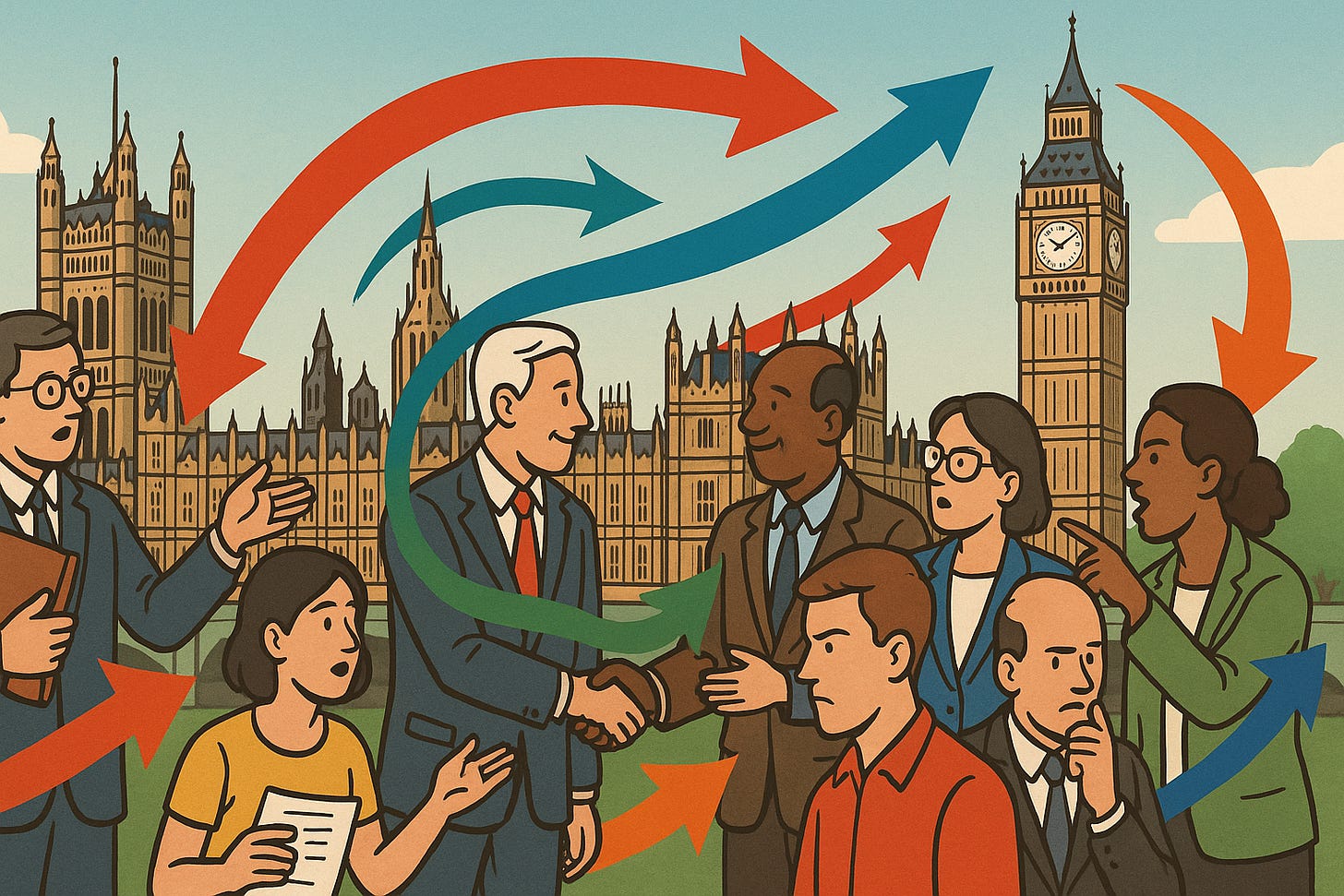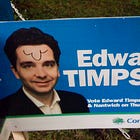Why politicians so often fail us all
With Party Conference season here, there is an even greater focus on politicians than usual. Let us answer the question, why do politicians so often fail us all? Public choice theory has some answers.
Introducing public choice theory - politics without the romance
I have written before about why MPs do it from a practical perspective, but why do they act the way they do to win elections and once in power? Why does politics so often lead to unsatisfactory outcomes? Why are so many voters so disengaged from the political process in a democracy?
This project is about lifting the lid on why politics and the public debate so often fails us all, so we decided it was time to introduce this important field of study: public choice theory offers explanations.
You can find a primer here, and this article sets out some key themes.
What is public choice?
Public Choice applies economic methods to politics and government. Rather than assuming politicians act for some mystical "public interest," it recognises that political actors – voters, politicians, bureaucrats – are motivated by self-interest, just like market participants. Economics isn't just about money; it's about how people choose to spend resources (time and effort) to achieve their goals.
In politics, this means understanding how individuals pursue their interests through collective decision-making, but unlike markets, where both parties must agree, government uses coercion: minorities must accept majority decisions.
During my 14 years in parliament, I heard endlessly about "market failure" in environments of heavy state regulation: that was just the start of politicians and officials responding to incentives not to accept blame. Other aspects of public choice theory I saw frequently in action were as follows.
Voting paradoxes
Suppose voters choose between three options – Rock, Paper and Scissors. Paper might beat Rock, Scissors beat Paper but Rock beats Scissors. Which is the legitimate winner? There isn't one: we cycle endlessly.
This demonstrates that electoral outcomes depend heavily on how elections are managed, not some objective "public will." Different voting systems produce different results, none more "correct" than others. But you have to choose a system and there are noble arguments for each one.
The tyranny of (interested) minorities
Small, organised groups with concentrated interests consistently outmaneuver larger, diffuse groups like consumers or taxpayers.
Professional bodies seeking licensing restrictions have powerful incentives to lobby effectively – the benefits are concentrated among members. Meanwhile, consumers face only small individual costs, making organisation difficult due to free-rider problems.
The result: more regulations, subsidies, higher taxes and bigger government than most people actually want.
Rational ignorance and the drift to the middle
Voters rationally choose to remain uninformed because the chance their single vote decides an election is microscopic, while becoming informed costs time and effort.
Consequently, many people vote based on party labels or don't vote at all. This creates space for well-informed interest groups to wield disproportionate influence.
Politicians, seeking to maximise votes, cluster around the median voter position, leaving non-centrist voters largely unrepresented and reducing meaningful choice.
At the time of writing, the “uniparty” produced by the drift to the middle appears to have been rejected: as we approach the next general election, it will be fascinating to see how things play out as parties try to maximise their result…
Starmer’s recent controversy over his “island of strangers” speech was one example of the drift to the middle.
Logrolling
Vote-trading – "you support my road project, I'll support your hospital" – allows minorities to form coalitions and pass legislation.
While sometimes reflecting genuine intensity of preferences, logrolling often produces wasteful spending and government expansion beyond what anyone actually wants. Omnibus bills bundle popular and unpopular measures, making opposition difficult and obscuring true costs from voters.
The application of this to spending is more apparent in the system of the USA, but in the UK I saw it in action, for example, when I persuaded large numbers of Eurosceptics to support a campaign to moderate the politically-exposed persons regime, which was getting out of hand. MPs also support one another’s hopeless private members’ bills when they are not interested in the substance of the other bill, simply to propel their own bill further through the process.
Rent seeking
Interest groups expend enormous resources lobbying for government-granted privileges – such as taxi licenses, professional restrictions and quotas – that generate returns above competitive levels.
This creates substantial deadweight losses: not only do these privileges transfer wealth from the public to favoured groups, but the resources spent seeking them represent pure waste. The political system becomes corrupted as groups compete for favour rather than improving products or services.
Bureaucratic incentives
Civil servants maximise their budgets, bringing power, status and security. They possess superior information to legislators, exploit vague legislation and can threaten politicians through leaks or public criticism. This drives government expansion regardless of public interest, creating larger, less efficient bureaucracies than desired while making meaningful reform politically dangerous for elected officials.
That said, I once cancelled £75m worth of undeliverable projects, which should be no business of the state in an evening, redirecting the money to more urgent needs1. Those officials whose grade turned on running those budgets were understandably disappointed.
Conclusion
Everyone knows that democracy is the worst form of government, apart from all the other systems which have been tried from time to time. We are stuck with it.
But public choice theory shows both that it is worse than you feared and that there are solutions. Constitutional constraints are essential, such as unanimous agreement on the rules governing future collective decisions, qualified majorities for high-stakes issues, fiscal rules limiting tax burdens and requiring balanced budgets. Federalism allows citizens to "vote with their feet" by moving home, constraining local exploitation. Competition between agencies, sunset clauses on legislation and payment by results can improve bureaucratic performance.
However, what public choice theory teaches us most fundamentally is that we must abandon romantic notions about politics and instead design institutions assuming self-interest will prevail – because it always will.
In this case, the NHS, but that is another article.




A superb article explaining the life and workings of being an MP, and how the UK system works well and not.
Government is run by people - and people are flawed. There is no lovely solution in politics - not even (or especially) if you ban all those you dislike!
I recommend people think.abput the constitution they want, more than the Party. How we are treated when out of power is critical. Hence our emphasis on individual rights. This (and only this) prevents totalitarianism.